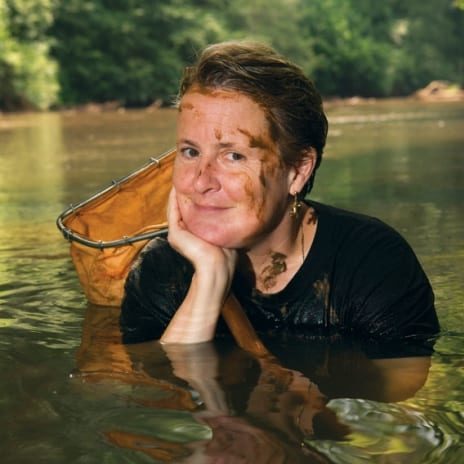
Dr. Catherine Pringle is a Distinguished Research Professor at the University of Georgia’s (UGA) Odum School of Ecology (OSE) where she specializes in the study of freshwater aquatic ecosystems and conservation ecology. An over-arching goal of her lab is to link research on stream ecosystems with conservation through resource management applications, environmental outreach, and/or synthesis activities. Dr. Pringle’s research focuses on species-community-ecosystem linkages, effects of disturbance on freshwater ecosystems (particularly streams), and hydrologic connectivity. She received a B.S. (1976), M.S. (1979) and Ph.D. (1986) from the University of Michigan in Ann Arbor, followed by post-doctoral positions at the University of California at Berkeley and Santa Barbara (1986-90), and Cornell University (1991-92).
Dr. Pringle joined UGA in 1993 and served as the Chair of OSE’s Conservation Ecology & Sustainable Development (CESD) Graduate M.S. Program from 1993-2020. She served as a past-President of the Society for Freshwater Science, and is a Fellow of the American Association for the Advancement of Science (AAAS).
Dr. Pringle’s research contributions include 197 refereed journal articles, >50 book chapters & symposium proceedings, and 3 co-edited books. She received UGA’s Creative Research Medal in recognition of an experimental research technique (underwater electric exclosure device) that she developed, which has been widely used among stream ecologists to assess the top-down effects of consumers in streams.
A total of 23 PhD and 22 MS students have graduated from her laboratory and she currently serves as major advisor for one PhD student. Lab alumni have gone on to work in government (EPA, USGS, US Park Service), the not-for-profit sector (Nature Conservancy, Children’s Rainforest), and academia (thirteen alumni are professors or in-tenure-track positions). Research funding has been provided primarily from the NSF, USDA Forest Service, and US EPA, but also from the Nature Conservancy, Conservation Food and Health Foundation, National Geographic Society, Rainforest Alliance, and Natural Resources Conservation Service. Dr. Pringle served as the lead investigator (1985-2016) on the long-term STREAMS research project in Costa Rica (NSF-LTREB) and she is currently a co-investigator on this ongoing project (2022-28). She also contributed to two NSF-funded long-term ecological research (LTER) projects as senior personnel: the Luquillo LTER Project, Puerto Rico (which she currently remains involved in) and the Coweeta LTER Project, North Carolina. She served as a co-PI on the NSF-TADS (Tropical Amphibian Declines) Project in Panama, which focuses on the response of tropical stream ecosystems to frog (tadpole) extirpation. She also served as a co-PI on a collaborative NSF-FIBR Project in Trinidad that examined how ecological and evolutionary processes interact in nature. While most of Pringle’s tropical research has been in the Caribbean, she and her graduate students have also conducted studies in Madagascar and Kosrae, Micronesia.
Professor Pringle has served on advisory panels for the National Academy of Sciences, the National Science Foundation, and the Organization for Tropical Studies. She also served as: Chair of the Ecological Society of America’s (ESA) Sustainable Biosphere Initiative Steering Committee; Chair of the ESA’s Awards Committee; member of the National Center for Ecological Synthesis (NCEAS) Science Advisory Board; member of the DIVERSITAS International Task Force on Freshwater Biodiversity; and a member of the AAAS Executive Committee for Council Affairs. She served as an elected representative for the International Society of Limnology and Oceanography for four consecutive three-year terms.